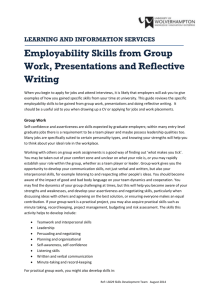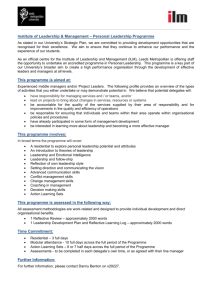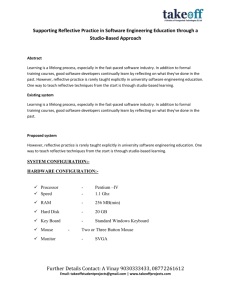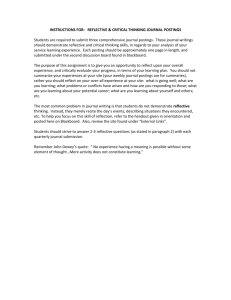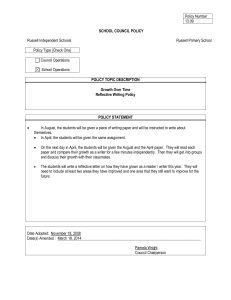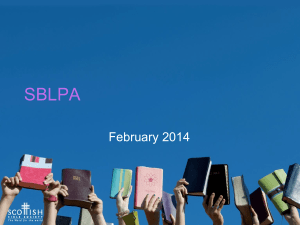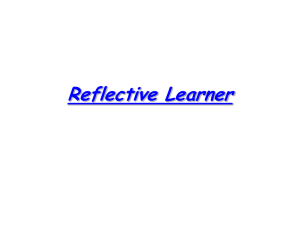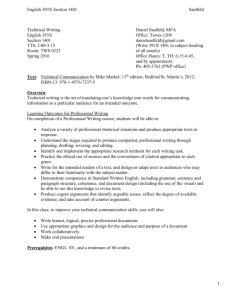Employability Skills from Group Work, Presentations and Reflective
advertisement
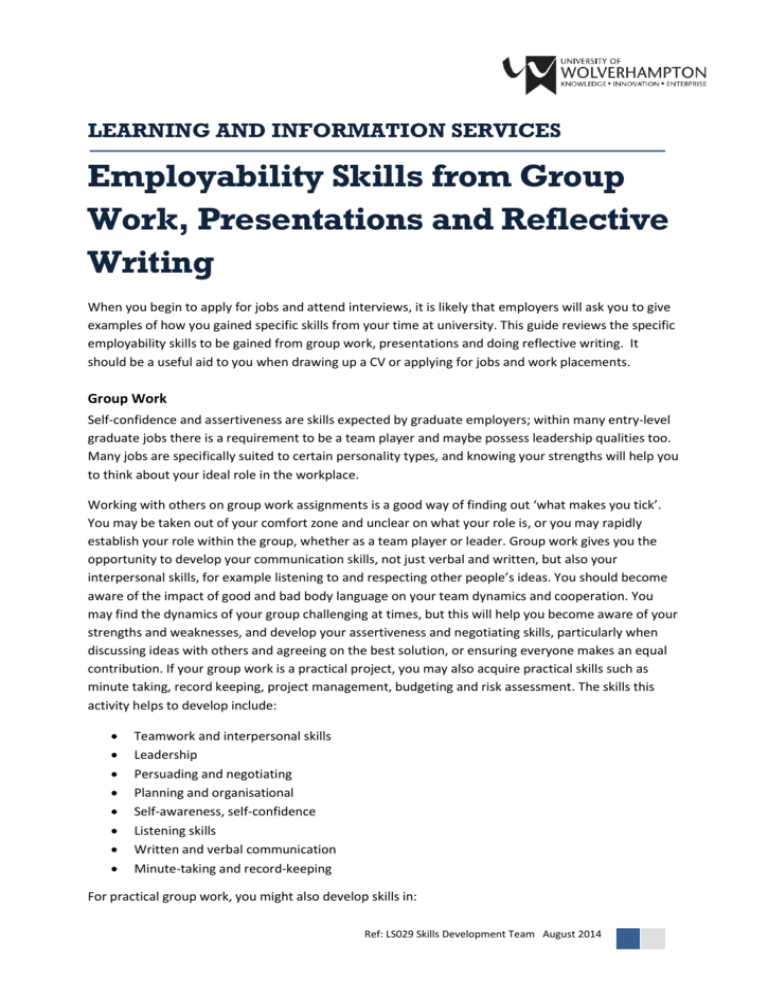
LEARNING AND INFORMATION SERVICES Employability Skills from Group Work, Presentations and Reflective Writing When you begin to apply for jobs and attend interviews, it is likely that employers will ask you to give examples of how you gained specific skills from your time at university. This guide reviews the specific employability skills to be gained from group work, presentations and doing reflective writing. It should be a useful aid to you when drawing up a CV or applying for jobs and work placements. Group Work Self-confidence and assertiveness are skills expected by graduate employers; within many entry-level graduate jobs there is a requirement to be a team player and maybe possess leadership qualities too. Many jobs are specifically suited to certain personality types, and knowing your strengths will help you to think about your ideal role in the workplace. Working with others on group work assignments is a good way of finding out ‘what makes you tick’. You may be taken out of your comfort zone and unclear on what your role is, or you may rapidly establish your role within the group, whether as a team player or leader. Group work gives you the opportunity to develop your communication skills, not just verbal and written, but also your interpersonal skills, for example listening to and respecting other people’s ideas. You should become aware of the impact of good and bad body language on your team dynamics and cooperation. You may find the dynamics of your group challenging at times, but this will help you become aware of your strengths and weaknesses, and develop your assertiveness and negotiating skills, particularly when discussing ideas with others and agreeing on the best solution, or ensuring everyone makes an equal contribution. If your group work is a practical project, you may also acquire practical skills such as minute taking, record keeping, project management, budgeting and risk assessment. The skills this activity helps to develop include: Teamwork and interpersonal skills Leadership Persuading and negotiating Planning and organisational Self-awareness, self-confidence Listening skills Written and verbal communication Minute-taking and record-keeping For practical group work, you might also develop skills in: Ref: LS029 Skills Development Team August 2014 Risk assessment Budgeting and project management Presentations Giving presentations is an essential part of most graduate professions. Presentations are used in a wide range of scenarios, such as pitching a new idea and asking for funding, putting a case to management for a new project, briefing your colleagues on a topic or selling a new product to customers. Awareness of your audience, as well as an understanding of body language and clear verbal communication, are all essential to success. The skills this activity helps to develop include: IT skills Verbal communication skills Communication at appropriate level to audience Listening skills and audience awareness Confidence and self-reliance Planning and organisational skills Reflective Writing Reflective writing is usually structured around reflecting upon specific assignments you have undertaken. It typically will require an accurate account of the activity you took part in, followed by a self-evaluation of your performance. It will reflect on areas where you succeeded, areas where you feel that you under-achieved, what you have learnt and your ideas for improvement. It may also draw upon theories and examples from your subject area, and use appropriate professional vocabulary, particularly if reflecting on a work-based placement. In your reflection, you may decide that you need to learn more about a subject area, improve your communication skills or really work on your organisational skills. You may be asked to do reflective writing as part of one or more assignments, or simply choose to keep a blog or diary reflecting on aspects of your study or work-based practice. Reflection is key to developing your self-awareness and planning your personal and professional development. By regularly reflecting on your achievements and setbacks, you will begin to recognise your strengths and plan ways to address any areas of weakness in your capabilities. Many professions require you to keep reflective logs alongside evidence of achievement for further workplace accreditation. Through reflective writing, you will develop your: Written communication skills Problem solving and analytical skills Self-Awareness – knowledge of strengths and weaknesses Skills for Continued Professional Development (CPD) Use of professional language / vocabulary Cite this work: Learning and Information Services (2013) Employability Skills from groupwork, presentations and reflective writing [online]. Wolverhampton: University of Wolverhampton. [Accessed give date accessed]. Available at: <http://www.wlv.ac.uk/skills>. To request this document in an alternative format please contact skills@wlv.ac.uk Ref: LS029 Skills Development Team August 2014
